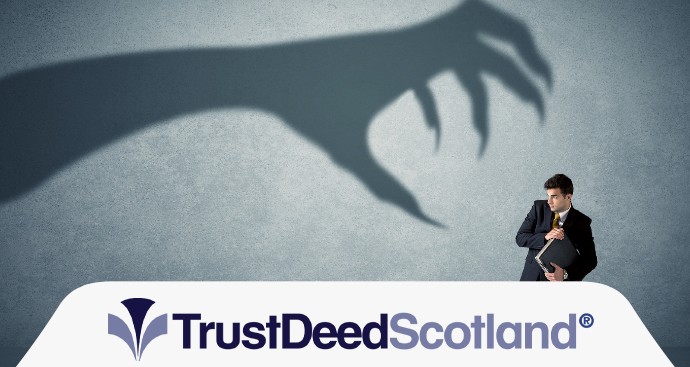Halloween 2020 is set to look different than any other in Scotland with the Scottish Government asking us to avoid guising and thus help prevent spreading Coronavirus.
Residents of Scotland with old debts beware: a forgetful moment from your past could results in old debts rising from the dead and coming back to haunt you. Zombie debt.
So, as we’re at home this Halloween, we’ve put together a guide to help you understand more about what you’re options are. Helping you to avoid having a night of the living debt.
What are Zombie Debts?
Zombie debts are old accounts that may have been forgotten about and then either written off as ‘uncollectable’ and which have passed the time in which they can legally be collected. These can be anything from an old payday loan to a credit card debt. Even an old library fine.
Depending on the type of debt and how old the debt may be, you may be in for a nasty surprise, or it may become unenforceable due to becoming a Prescribed Debt, known more commonly across the UK as Statute Barred.
Are my statute barred debts written off?
A regulatory body say that it’s not fair for a creditor to keep asking you to pay a statute-barred or prescribed debt if you’ve told them you don’t intend to pay it.
In Scotland, If the creditor waits too long, the debt will become prescribed. Once a debt is prescribed, the law says it no longer exists so there’s nothing more the creditor can do collect it. This is outlined as part of the Prescriptions and Limitation (Scotland) Act 1973.
Statute barred debt in England refers to a debt that’s not enforceable because the time a creditor has to chase payment has passed. This is outlined under the Limitation Act 1980.
In England, Wales and Northern Ireland where under the Limitation Act 1980, a creditor has six years to chase most unsecured unpaid debts or twelve years for some mortgage shortfalls. This ‘limitation period’ starts from the time of your last payment or acknowledgement of the debt, not the total length of time you’ve been making payments.
The Limitation Act 1980 act states that when all of the following conditions are met a debt cannot be enforced:
- The creditor has not registered a CCJ against you (Known as a Decree in Scotland)
- You have not made a payment in the last six years (or with joint debts, the other person)
- You have not admitted the debt in writing in the last six years
- Where it’s a mortgage shortfall, the latter two restrictions are doubled to 12 years.
For most types of debt in Scotland, the prescription period is 5 years. Mortgage capital shortfalls have a longer prescription period of 20 years for the money that you borrowed while the interest charged on this has a prescription period of 5 years. Council tax and overpayment of social security benefits are also subject to a prescription period of 20 years.
If your creditor has already started action to obtain a Decree before the prescription period passed, the debt can’t become prescribed.
How did I get a Zombie Debt?
Zombie Debt comes in many forms, including legitimate debts that have been forgotten or ignored, Identity theft cases and I.T. errors.
The most common way of this happening is a combination of change of address, change of telephone and changed bank details. With no little way of knowing, we assume the debt has been paid and eventually may believe that we paid it off.
If you have built up a zombie debt and forgotten about it, don’t feel bad about it – it’s an easy oversight to make. But, if you have forgotten about a debt you are protected from harassment or any other contact from the creditor. You cannot be pursued through the courts, as the debt is deemed to have either been abandoned or repaid.
It involves unsecured credit from credit cards, store cards and the likes of council tax arrears. It does not apply to secured debt such as mortgages and money owed to the government for income tax, property tax, fines and student loans.
Help with unexpected debt?
If you have unaffordable debt, whether it’s from an old Zombie Debt, or more recent – You should always look for expert debt help in Scotland.
You can find out more about Trust Deed Scotland and find out why we’ve become the No.1 rated company in Trustpilot‘s debt relief services category.
If you are struggling with debts, we’re here for you. You’re not alone. Find out more about what is a Trust Deed in Scotland or about what trust deeds do, call us today on 01412210999 for friendly, non-judgemental advice.
